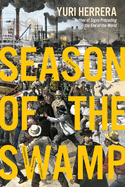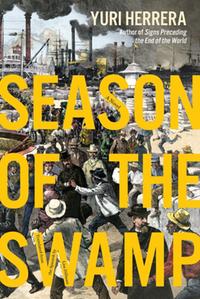
 By 1853, Benito Juárez had served as judge, deputy, and governor of the state of Oaxaca, but he would not become Mexico's first indigenous president until after a period of exile. Among other locations, he spent 18 months in exile in New Orleans, a time about which relatively little is known. With Season of the Swamp, Mexican writer Yuri Herrera (Signs Preceding the End of the World; Kingdom Cons; Ten Planets) sheds speculative light on this brief chapter in Juárez's life. Herrera's regular English translator, Lisa Dillman, again brings a precise ear for Herrera's linguistic play to this spellbinding fictionalized history.
By 1853, Benito Juárez had served as judge, deputy, and governor of the state of Oaxaca, but he would not become Mexico's first indigenous president until after a period of exile. Among other locations, he spent 18 months in exile in New Orleans, a time about which relatively little is known. With Season of the Swamp, Mexican writer Yuri Herrera (Signs Preceding the End of the World; Kingdom Cons; Ten Planets) sheds speculative light on this brief chapter in Juárez's life. Herrera's regular English translator, Lisa Dillman, again brings a precise ear for Herrera's linguistic play to this spellbinding fictionalized history.
Besides Herrera's contextualizing prologue, the name Benito Juárez almost never appears. Instead, readers accompany an unnamed protagonist, in close third-person perspective, from his arrival in this remarkable "city that served up accidents on a platter" through his departure, by which time "if one day he was dropped there without anyone telling him where he was, he'd know it was New Orleans even with his eyes closed." Juárez marvels at the heat, the Yellow Jack epidemic, the local culture soaked in music and dance, and the stray dogs. He has seen other cities--"Seville, Gibraltar, New York--all of them rich, but none like this, where you could so clearly see the blood on the gold." He is dismayed at the enslaved people, referred to as "the captured," sold in open markets and subjugated, as in the novella's memorable opening scene. He meets with fellow exiles and political minds, makes new friends, settles in. New Orleans is beautiful and horrifying, and Herrera portrays both aspects simultaneously, with humor and lyricism: "A moment later, the austere innkeeper began mopping up the sanguineous intimacies smeared all over the floor."
Wordplay and a special attention to language form a persistent feature in Herrera's work. A fellow expat claims Méjico, but Juárez recognizes it's been pronounced "not with a Mexican ex but a Spaniard's jay.... 'This is the vegetable market,' Cabañas veed iberically." Juárez is attuned to new languages, including music and body language, and thinks of language learning as related to his time spent teaching high school physics: "his students began to glimpse a new world in those equations, the same way you see animals in the clouds, except these animals actually existed." A sense of wonder and play, linguistic curiosity, and a knack for being both morbid and funny, contribute to an absorbingly pleasurable read, even amid the death and tragedy. Herrera offers another brilliant novella steeped in political and historical time and place. --Julia Kastner, librarian and blogger at pagesofjulia
Shelf Talker: Yuri Herrera applies his exceptional gift for succinct, imaginative storytelling to a fictionalized history of Benito Juárez in exile in New Orleans.

